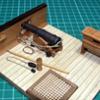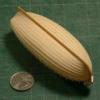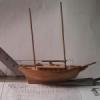Supplies of the Ship Modeler's Handbook are running out. Get your copy NOW before they are gone! Click on photo to order.
×
-
Posts
5,195 -
Joined
-
Last visited
Reputation Activity
-
 michael mott got a reaction from FriedClams in Bristol Pilot Cutter by michael mott - 1/8 scale - POF
michael mott got a reaction from FriedClams in Bristol Pilot Cutter by michael mott - 1/8 scale - POF
Bob thanks for the detailed information regarding the through hull outlets and the siphon loops. I had not really thought about this aspect of our modern small cruise boats let alone the older craft.
I agree...But.... but my grandaughter would not.
Seriously though The idea is to be able to show what can be seen relatively easily and a few things that need a little searching but still visible with perhaps a small dental type mirror. I do want to move on to the next project before I am too old to have fun.
Thank you to everyone who is following along and showing their appreciation in one way or another.
Michael
-
 michael mott got a reaction from MAGIC's Craig in Bristol Pilot Cutter by michael mott - 1/8 scale - POF
michael mott got a reaction from MAGIC's Craig in Bristol Pilot Cutter by michael mott - 1/8 scale - POF
Bob thanks for the detailed information regarding the through hull outlets and the siphon loops. I had not really thought about this aspect of our modern small cruise boats let alone the older craft.
I agree...But.... but my grandaughter would not.
Seriously though The idea is to be able to show what can be seen relatively easily and a few things that need a little searching but still visible with perhaps a small dental type mirror. I do want to move on to the next project before I am too old to have fun.
Thank you to everyone who is following along and showing their appreciation in one way or another.
Michael
-
 michael mott got a reaction from billocrates in Bristol Pilot Cutter by michael mott - 1/8 scale - POF
michael mott got a reaction from billocrates in Bristol Pilot Cutter by michael mott - 1/8 scale - POF
I had a long chat with the owner and he reminded me that we were on a budget with this refit so I mentioned that I would try to find a used copper sink, I found one on MYBAY it was the right price.
Checked the fit
Ok so here's how I did it
Cut out a bit of copper sheet
made up a former from some scrap maple 2x1.5x 3/4 then sanded it smooth. Annealed the copper and started bashing
Many annealings and bashings later with a leather mallet
and more bashings couple of different hammers but mostly with a too big ball pein.
A couple of clean up hammerings and then cleaned up the top and dropped it into the pickle .
I picked up the gauntlet Druxey you have a habit of dropping it.😉
I'm not going down that other rabbit hole
Greg I think I read an article about that Model in a Scale ships or similar magazine I seem to recall it had gold and silver fittings.
Eberhard, I have not figured it out yet I will be doing a bit of searching to see if I can find some better pictures of the type that is in Integrity.
Michael
-
 michael mott got a reaction from mtaylor in Bristol Pilot Cutter by michael mott - 1/8 scale - POF
michael mott got a reaction from mtaylor in Bristol Pilot Cutter by michael mott - 1/8 scale - POF
Bob thanks for the detailed information regarding the through hull outlets and the siphon loops. I had not really thought about this aspect of our modern small cruise boats let alone the older craft.
I agree...But.... but my grandaughter would not.
Seriously though The idea is to be able to show what can be seen relatively easily and a few things that need a little searching but still visible with perhaps a small dental type mirror. I do want to move on to the next project before I am too old to have fun.
Thank you to everyone who is following along and showing their appreciation in one way or another.
Michael
-
 michael mott got a reaction from Thukydides in Bristol Pilot Cutter by michael mott - 1/8 scale - POF
michael mott got a reaction from Thukydides in Bristol Pilot Cutter by michael mott - 1/8 scale - POF
Well here is the truth about the new sink.
First task was to start with a new former
And cut a new sheet of copper .031"
After laying out the cuts use jewelers saw.
Then without any annealing begin the folds
At this point I needed to do some cutting and used a small nibbler
Then the trimmed edges need to be cleaned up this was done by first unfolding the metal a little
Then using a bit of wood as a guide filed the edges.
The refolded and wired the seams together and used easyflo silver solder to join the seams. My silver soldering skills still leave a lot to be desired but I am improving.
and it looks better than the first one.
I would do it differently if I had to do it again, making only clean corner joints...... but that's for another boat.
Michael
-
 michael mott got a reaction from GrandpaPhil in Bristol Pilot Cutter by michael mott - 1/8 scale - POF
michael mott got a reaction from GrandpaPhil in Bristol Pilot Cutter by michael mott - 1/8 scale - POF
Well here is the truth about the new sink.
First task was to start with a new former
And cut a new sheet of copper .031"
After laying out the cuts use jewelers saw.
Then without any annealing begin the folds
At this point I needed to do some cutting and used a small nibbler
Then the trimmed edges need to be cleaned up this was done by first unfolding the metal a little
Then using a bit of wood as a guide filed the edges.
The refolded and wired the seams together and used easyflo silver solder to join the seams. My silver soldering skills still leave a lot to be desired but I am improving.
and it looks better than the first one.
I would do it differently if I had to do it again, making only clean corner joints...... but that's for another boat.
Michael
-
 michael mott got a reaction from FriedClams in Bristol Pilot Cutter by michael mott - 1/8 scale - POF
michael mott got a reaction from FriedClams in Bristol Pilot Cutter by michael mott - 1/8 scale - POF
Yes this is interesting, The model is really a vehicle for my learning about model ships and boats.
And in reality it is just that, because I am using materials and ideas from all sort of times and styles.
I spent some time today discussing the bashed up sink with the owner and he said "well I know we are on a budget but its not that tight, cant you find a better sink than that."
So looking around I found this one
Michael
-
 michael mott got a reaction from Valeriy V in Bristol Pilot Cutter by michael mott - 1/8 scale - POF
michael mott got a reaction from Valeriy V in Bristol Pilot Cutter by michael mott - 1/8 scale - POF
Well here is the truth about the new sink.
First task was to start with a new former
And cut a new sheet of copper .031"
After laying out the cuts use jewelers saw.
Then without any annealing begin the folds
At this point I needed to do some cutting and used a small nibbler
Then the trimmed edges need to be cleaned up this was done by first unfolding the metal a little
Then using a bit of wood as a guide filed the edges.
The refolded and wired the seams together and used easyflo silver solder to join the seams. My silver soldering skills still leave a lot to be desired but I am improving.
and it looks better than the first one.
I would do it differently if I had to do it again, making only clean corner joints...... but that's for another boat.
Michael
-
 michael mott got a reaction from Ryland Craze in Bristol Pilot Cutter by michael mott - 1/8 scale - POF
michael mott got a reaction from Ryland Craze in Bristol Pilot Cutter by michael mott - 1/8 scale - POF
It depends on the thickness of the material and the number of teeth. The coarser blades are generally easier for the wood. In this case the blade was fine enough to also cut the copper because it was sharp and had not become dull from cutting metal before.
This graphic representation shows the .031 copper and the #1 jewelers blade that has 47 teeth per inch next to the edge of the metal there need to be at least 2 teeth engaging with the metal or the blade will catch and there is a possibility of ripping off a tooth and or snapping the blade.
I hope this answers your question. I also have some #8/0, #5/0, #3/0 The #8/0 is the finest.
Michael
-
 michael mott got a reaction from WalrusGuy in Bristol Pilot Cutter by michael mott - 1/8 scale - POF
michael mott got a reaction from WalrusGuy in Bristol Pilot Cutter by michael mott - 1/8 scale - POF
Bob thanks for the detailed information regarding the through hull outlets and the siphon loops. I had not really thought about this aspect of our modern small cruise boats let alone the older craft.
I agree...But.... but my grandaughter would not.
Seriously though The idea is to be able to show what can be seen relatively easily and a few things that need a little searching but still visible with perhaps a small dental type mirror. I do want to move on to the next project before I am too old to have fun.
Thank you to everyone who is following along and showing their appreciation in one way or another.
Michael
-
 michael mott got a reaction from Retired guy in US Brig Syren by WalrusGuy - FINISHED - Model Shipways - Scale 1:64 - Second wooden ship build
michael mott got a reaction from Retired guy in US Brig Syren by WalrusGuy - FINISHED - Model Shipways - Scale 1:64 - Second wooden ship build
Your work on the masts and rigging so far is looking really great nice and tidy, Im sure you will have no trouble with the ratlines.
Michael
-
 michael mott reacted to Bitao in YOUNG AMERICA 1853 by Bitao - FINISHED - 1:72
michael mott reacted to Bitao in YOUNG AMERICA 1853 by Bitao - FINISHED - 1:72
The construction of the main deck has finally begun.......
-
 michael mott got a reaction from FriedClams in Bristol Pilot Cutter by michael mott - 1/8 scale - POF
michael mott got a reaction from FriedClams in Bristol Pilot Cutter by michael mott - 1/8 scale - POF
It depends on the thickness of the material and the number of teeth. The coarser blades are generally easier for the wood. In this case the blade was fine enough to also cut the copper because it was sharp and had not become dull from cutting metal before.
This graphic representation shows the .031 copper and the #1 jewelers blade that has 47 teeth per inch next to the edge of the metal there need to be at least 2 teeth engaging with the metal or the blade will catch and there is a possibility of ripping off a tooth and or snapping the blade.
I hope this answers your question. I also have some #8/0, #5/0, #3/0 The #8/0 is the finest.
Michael
-
 michael mott reacted to wefalck in Bristol Pilot Cutter by michael mott - 1/8 scale - POF
michael mott reacted to wefalck in Bristol Pilot Cutter by michael mott - 1/8 scale - POF
Talking about sawing thin sheet-metal: many years ago I built a kind of POB model of a steam-tug by constructing the keel part and bulkheads from 0.5 mm and 0.25 mm brass sheet respectively. At that time it did not occur to me to laminate the brass onto some plywood (and I would have considered that wasteful, but was struggling even with the fine sawblades I had. I then discovered that putting the sawbladed upside down into the saw worked very well.
I was joking about the copper pans in the pantry - I think one should not turn this kind of model into a floating dollhouse.
-
 michael mott got a reaction from Ryland Craze in Bristol Pilot Cutter by michael mott - 1/8 scale - POF
michael mott got a reaction from Ryland Craze in Bristol Pilot Cutter by michael mott - 1/8 scale - POF
Well here is the truth about the new sink.
First task was to start with a new former
And cut a new sheet of copper .031"
After laying out the cuts use jewelers saw.
Then without any annealing begin the folds
At this point I needed to do some cutting and used a small nibbler
Then the trimmed edges need to be cleaned up this was done by first unfolding the metal a little
Then using a bit of wood as a guide filed the edges.
The refolded and wired the seams together and used easyflo silver solder to join the seams. My silver soldering skills still leave a lot to be desired but I am improving.
and it looks better than the first one.
I would do it differently if I had to do it again, making only clean corner joints...... but that's for another boat.
Michael
-
 michael mott got a reaction from mtaylor in Bristol Pilot Cutter by michael mott - 1/8 scale - POF
michael mott got a reaction from mtaylor in Bristol Pilot Cutter by michael mott - 1/8 scale - POF
I'll have to wrap my head around this one! Just a never ending list of details...will it ever end?😉
Michael
-
 michael mott got a reaction from Tony Hunt in Bristol Pilot Cutter by michael mott - 1/8 scale - POF
michael mott got a reaction from Tony Hunt in Bristol Pilot Cutter by michael mott - 1/8 scale - POF
Well here is the truth about the new sink.
First task was to start with a new former
And cut a new sheet of copper .031"
After laying out the cuts use jewelers saw.
Then without any annealing begin the folds
At this point I needed to do some cutting and used a small nibbler
Then the trimmed edges need to be cleaned up this was done by first unfolding the metal a little
Then using a bit of wood as a guide filed the edges.
The refolded and wired the seams together and used easyflo silver solder to join the seams. My silver soldering skills still leave a lot to be desired but I am improving.
and it looks better than the first one.
I would do it differently if I had to do it again, making only clean corner joints...... but that's for another boat.
Michael
-
 michael mott got a reaction from FriedClams in Bristol Pilot Cutter by michael mott - 1/8 scale - POF
michael mott got a reaction from FriedClams in Bristol Pilot Cutter by michael mott - 1/8 scale - POF
Well here is the truth about the new sink.
First task was to start with a new former
And cut a new sheet of copper .031"
After laying out the cuts use jewelers saw.
Then without any annealing begin the folds
At this point I needed to do some cutting and used a small nibbler
Then the trimmed edges need to be cleaned up this was done by first unfolding the metal a little
Then using a bit of wood as a guide filed the edges.
The refolded and wired the seams together and used easyflo silver solder to join the seams. My silver soldering skills still leave a lot to be desired but I am improving.
and it looks better than the first one.
I would do it differently if I had to do it again, making only clean corner joints...... but that's for another boat.
Michael
-
 michael mott got a reaction from mtaylor in Bristol Pilot Cutter by michael mott - 1/8 scale - POF
michael mott got a reaction from mtaylor in Bristol Pilot Cutter by michael mott - 1/8 scale - POF
It depends on the thickness of the material and the number of teeth. The coarser blades are generally easier for the wood. In this case the blade was fine enough to also cut the copper because it was sharp and had not become dull from cutting metal before.
This graphic representation shows the .031 copper and the #1 jewelers blade that has 47 teeth per inch next to the edge of the metal there need to be at least 2 teeth engaging with the metal or the blade will catch and there is a possibility of ripping off a tooth and or snapping the blade.
I hope this answers your question. I also have some #8/0, #5/0, #3/0 The #8/0 is the finest.
Michael
-
 michael mott got a reaction from BANYAN in Bristol Pilot Cutter by michael mott - 1/8 scale - POF
michael mott got a reaction from BANYAN in Bristol Pilot Cutter by michael mott - 1/8 scale - POF
Well here is the truth about the new sink.
First task was to start with a new former
And cut a new sheet of copper .031"
After laying out the cuts use jewelers saw.
Then without any annealing begin the folds
At this point I needed to do some cutting and used a small nibbler
Then the trimmed edges need to be cleaned up this was done by first unfolding the metal a little
Then using a bit of wood as a guide filed the edges.
The refolded and wired the seams together and used easyflo silver solder to join the seams. My silver soldering skills still leave a lot to be desired but I am improving.
and it looks better than the first one.
I would do it differently if I had to do it again, making only clean corner joints...... but that's for another boat.
Michael
-
 michael mott got a reaction from mtaylor in Bristol Pilot Cutter by michael mott - 1/8 scale - POF
michael mott got a reaction from mtaylor in Bristol Pilot Cutter by michael mott - 1/8 scale - POF
Yes this is interesting, The model is really a vehicle for my learning about model ships and boats.
And in reality it is just that, because I am using materials and ideas from all sort of times and styles.
I spent some time today discussing the bashed up sink with the owner and he said "well I know we are on a budget but its not that tight, cant you find a better sink than that."
So looking around I found this one
Michael
-
 michael mott got a reaction from Jack12477 in Bristol Pilot Cutter by michael mott - 1/8 scale - POF
michael mott got a reaction from Jack12477 in Bristol Pilot Cutter by michael mott - 1/8 scale - POF
It depends on the thickness of the material and the number of teeth. The coarser blades are generally easier for the wood. In this case the blade was fine enough to also cut the copper because it was sharp and had not become dull from cutting metal before.
This graphic representation shows the .031 copper and the #1 jewelers blade that has 47 teeth per inch next to the edge of the metal there need to be at least 2 teeth engaging with the metal or the blade will catch and there is a possibility of ripping off a tooth and or snapping the blade.
I hope this answers your question. I also have some #8/0, #5/0, #3/0 The #8/0 is the finest.
Michael
-
 michael mott got a reaction from druxey in Bristol Pilot Cutter by michael mott - 1/8 scale - POF
michael mott got a reaction from druxey in Bristol Pilot Cutter by michael mott - 1/8 scale - POF
I'll have to wrap my head around this one! Just a never ending list of details...will it ever end?😉
Michael
-
 michael mott got a reaction from mtaylor in Bristol Pilot Cutter by michael mott - 1/8 scale - POF
michael mott got a reaction from mtaylor in Bristol Pilot Cutter by michael mott - 1/8 scale - POF
Well here is the truth about the new sink.
First task was to start with a new former
And cut a new sheet of copper .031"
After laying out the cuts use jewelers saw.
Then without any annealing begin the folds
At this point I needed to do some cutting and used a small nibbler
Then the trimmed edges need to be cleaned up this was done by first unfolding the metal a little
Then using a bit of wood as a guide filed the edges.
The refolded and wired the seams together and used easyflo silver solder to join the seams. My silver soldering skills still leave a lot to be desired but I am improving.
and it looks better than the first one.
I would do it differently if I had to do it again, making only clean corner joints...... but that's for another boat.
Michael
-
 michael mott got a reaction from cog in Bristol Pilot Cutter by michael mott - 1/8 scale - POF
michael mott got a reaction from cog in Bristol Pilot Cutter by michael mott - 1/8 scale - POF
Yes this is interesting, The model is really a vehicle for my learning about model ships and boats.
And in reality it is just that, because I am using materials and ideas from all sort of times and styles.
I spent some time today discussing the bashed up sink with the owner and he said "well I know we are on a budget but its not that tight, cant you find a better sink than that."
So looking around I found this one
Michael







.thumb.jpg.62d1d69fed1f32364417cb1f9cdeb009.jpg)



